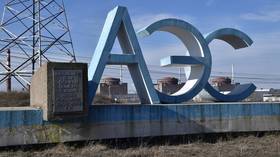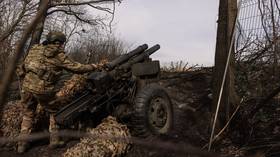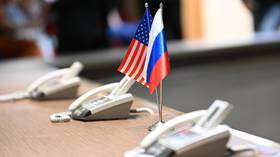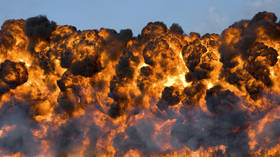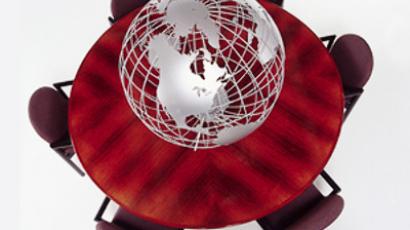"Not even Jesus could reverse the decline in the US"
The world economy is not only showing few signs of recovery, but we are also looking at the end of the American century, according to German author and economist William Engdahl.
In an exclusive interview with RT, he highlights the different ways in which the crisis has affected America and Europe and their subsequent responses.
RT: Recently we have seen several American banks beat the forecast and record an increase in profit. So, is the worst now over for the world's economy?
William Engdahl: This is by no means the sign of the end of the crisis. I estimate that we are perhaps 40% into the losses alone in the US real estate sector and these banks.
When we talk about banks we really talk at most about seven or eight huge institutions that are in the center of the crisis and not about tens of thousands of smaller banks in the US.
RT: So, in your opinion, do you think it is too soon to be optimistic?
W.E.: Absolutely too soon to be optimistic in the US. The US is the heart of a global problem, the core of the problem. And US financial and banking deregulations since the end of the 1990s are the proximate cause of the problem.
And that is a process now which is going to put the US into what I called ten years of hell. It is going to be worse in some respect than the Great Depression of the 1930s for most Americans, and everything that the current administration and the previous administration have done about the problem is merely going to make it worse for the actual economy.
RT: So now let's shift to Eastern Europe. Could you perhaps paint us a picture about the situation there at the moment? Which countries are the most affected?
W.E.: The problem in Eastern Europe is a derivative problem of cheap credit coming out of Wall Street for the last seven years. And as the [Federal Reserve] lowered its interest rates after 2002, partly to create this real estate bubble and to feed the Wall Street banks’ securitization process, the interest rates worldwide came down: the European interest rates, and so forth. So, banks in Europe were able to borrow money very cheaply and lend it out to Eastern European countries that were in the EU, like Poland, or Hungary, or the Czech Republic.
I don't see it as the same kind of crisis as the derivatives crisis in the US banks, because there is a real housing deficit after 50 years of the controlled economy command economy of the Warsaw Pact Soviet era. And people do have jobs there. This is not derivative speculation off the books. This is simply normal banking loans. And what EU governments have done in one form or another is to step in with IMF funds – I am not a fan of IMF in any way – but the purpose of the funds was to stabilize the currency so that it does not become a speculative target and make the crisis worse. I think for the moment that it's, quote-on-quote, “under control.” It does not have the leverage potential that the American crisis has.
RT: And Russia is currently in the similar situation with rumors that many banks will soon go bust if more negotiation does not happen with the West sometime soon. So what doe you think is the best option available to Russia?
W.E.: Russia has to, and this is I think one thing that the current government and when Vladimir Putin was president tried very much to do, is to bring the crucial elements of the sovereign nation back under state control.
That does not say going back to the era of central planning communism, but certainly to control your currency, to control your credit system – these are things that every sovereign system should rightly have. And in terms of the banking crisis perhaps there are some banks that would do better if nationalized if the losses are too great. At least nationalized so that they could be then cleaned up from the toxic waste and the bad investments and that the real economy comes out of this as a healthy factor and not pure financial speculation for the good of a few oligarchs at the expense of the Russian economy and Russian people.
RT: So how long do you think it is going to take before we see the end of this recession?
W.E.: The point is we are at an epochal change. This is something that happens perhaps every four or five hundred years. This is not a once a decade recession we are living through. And I call it in my new book the ‘Decline of the American century’. This is a terminal decline as you had with the British Empire after WWI. It would not matter if Jesus Christ was the President of the US today. There would be nothing he could do to reverse that decline process. We would almost have to reorganize and start from scratch, because the cancer of this financial system has embedded so deeply that they’ve destroyed the industrial technology in the US.
They outsourced manufacturing over the past 25-30 years to Asia, to Eastern Europe, all over the world. The American elite have rotted itself from the inside out over the past 30-40 years since the early 1970s.
So Europe, very much including Russia or let's say Eurasia… Eurasia is a vast continent which has every resource man could imagine for everything we would want to build economically. It has the brainpower, it has the scientific talents, and we have not totally destroyed that as in the case of the US. And that is all we need. It has the raw materials, Russia has unlimited resources of natural gas and oil. The Russian geology is light years ahead of American and Western geology, geophysics let's say, because it is based on real physics science and not on hocus-pocus to hide the fact of how much oil the world has. There is nothing that is lacking.
The decision in the Western Europe, the EU is, for many European elites, I know this from discussions here in Germany in the recent years – they have to make a choice, and they’re schizophrenic about that choice right now: either strengthen the Atlantic alliance with Washington and go down with the sinking Titanic called the American century, or carefully try to reorient the supertanker called the EU and build bridges of cooperation with Russia above all, with China above all for economic markets and whatnot.
RT: What are your thoughts on US President Barack Obama? Do you think he is the man to control the situation?
E.W.: No. To my mind, and I said this in print a year before Barack Obama became president, the American power establishment since the time at least of Abraham Lincoln, with the possible exception of John F. Kennedy, has never allowed any candidate to get near White House who they do not totally control.
We see that in the case of president Obama, so there is nothing that the Obama administration is doing to rock the boat. He is merely, if you will, a cosmetic change. How do you say – ‘old wine in a new bottle’? That’s Barack Obama. He is simply an attempt to deceive, to put the rest of the world off balance, but I think it is certainly wearing thin on the American public. They realize he has not done anything fundamental to improve the situation. He has, I think, perhaps another two or three months before he becomes, like George Bush, the most hated man in America.
RT: You touched upon George Bush there. In one of your books you wrote about the hidden history of oil and money, and how that it is hidden cause, the underlying cause, behind a lot of conflicts since WWII. So, if we consider the US agenda in Iraq – was it about oil?
W.E.: Very much it was about oil but not in the sense that many journalists speculated at the time.
The question of oil for the United States’ elite – first of all let's look at the Bush-Cheney presidency. Institutionally, the Bush-Cheney presidency represented the geopolitical power of the American military industry complex combined with big oil. They are inseparable.
Halliburton is this poster child for this. Halliburton is at one and the same time the largest construction company building military bases around the world for the Pentagon, and Halliburton is also the largest oil field geophysical services company around the world.
So they’re in every country where there is suspected to be oil, onshore or offshore. So that is a massive intelligence capability. But the point about controlling Iraq and militarizing the Middle East goes back to something that US Secretary of State Henry Kissinger said in the 70s. If you control the oil you control whole nations, or groups of nations.
Who was in Iraq before the war? China, Russia, and France. Who howled with protest in the UN Security Council and refused to sanction the US war against Saddam Hussein? China, Russia, and France – for a very good reason. The control of Iraq militarily means that the emerging powers of Eurasia lose the ability to have an independent supply line of oil. Look around Africa. Where are the hot spots in Africa? Darfur. Ask yourself why after 2004 does genocide in Darfur suddenly become such a human concern for George W. Bush that he is crying crocodile tears or George Clooney the actor who is going on stage pleading to stop genocide in Africa? It just so happens if you look beneath the surface – Darfur has huge untapped oil recourses.
RT: And continuing then on the subject of oil, many people forecasted that the price of oil will be stable for years to come, for decades actually. Do you think that Russia was perhaps wrong in concentrating all of its attention on oil?
W.E.: No, I don't. I think the strategy of then president Putin, and now president Medvedev’s government to use Russia's vast recourses of natural gas and oil is highly intelligent and absolutely crucial part of trying to counterweight the military power of Washington by creating networks of economic cooperation with Western Europe, especially Germany. I think I would do the same myself, were I sitting in Moscow.




